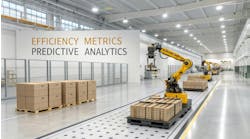Despite businesses moving from a focus on resilience during COVID to a new perspective of ‘regenerative’, currently only 43% of businesses effectively operate in this way, according to a new report from Kearney, Regenerate: For a future that works for everyone, which surveyed 800 C-suite business leaders from across the globe.
Additionally, over half (56%) of executives say their current business transformations aren’t working.
What is a ‘regenerative business’?
Embedding new digital models and advanced analytics, while making supply chains and people models sustainable for business and society is now mission critical. Businesses that wish to fulfill these commitments will require a long-term approach of becoming truly ‘regenerative’. This means looking beyond resilience and proactively asking where value can be added back into society and the wider world.
Instead of optimizing for efficiency, the next generation of business will regenerate for speed, using external data plus analytical and advanced AI to quickly and accurately see and make sense of what’s happening outside their own four walls.
By regenerating the entire business system, from supply chain to customer experience and organizational culture, both business and the public sector can ensure that our teams, companies, and the broader environment can reach and sustain their full potential.
The view from the C-Suite
The report found that 99% of global business leaders thought that becoming a regenerative business was important. However, more guidance is needed on this new business paradigm, as only 43% reported that their companies were already operating this way effectively. This is a meaningful gap to close.
Similarly, only 40% of businesses reported effectively implementing a regenerative culture and 45% said they were already operating a regenerative supply chain.
Attitudes across the C-suite differ, too. Almost half (48%) of CEOs globally say that their business is very effective at operating regeneratively. Whilst COOs broadly agree that their companies are operating regeneratively, 58% say there is still further progress to be made.
The research shows that regenerative business is also influencing the leadership style of the C-Suite globally. A very small minority (2%) of CEOs said they don’t see any need to factor the regenerative model into their leadership, but almost half (47%) say they are currently doing so effectively. This is a business gap worth closing
Which industries are leading the way?
Although 92% of C-suite leaders believe in the responsibility of business to create ‘a future that works for everyone’, Kearney’s research found that the retail sector is ahead of the curve in making this happen. Over half of retail businesses (53%) are operating regeneratively and over a third (35%) are doing it very effectively, in part by relying on technology to help limit waste of energy and materials.
For example, the energy sector is also following suit and taking a regenerative approach to sustainability, with 46% of C-suite leaders in this sector reporting that they are already operating regeneratively very effectively. Alongside changes to the supply chain, energy leaders believe the greatest opportunity for regeneration lies with systematic changes to their business model, including leveraging a responsible and deepened view of advanced analytics.
“The results of our survey make it clear that businesses want to shift from a merely resilient strategy to a fully regenerative one that is more transformative at its core, whether that requires truly digitizing their obsolete global supply chains, embedding analytics into the entire operating model or upgrading the way they develop and inspire diverse and sustainable workplaces, said Alex Liu, managing partner and chairman at Kearney, in a statement. " Unexpected is the new expected, there is no normal as we navigate these necessary self-disruptions. More is needed and more is possible.
“A regenerative business model plugs this gap and takes businesses a step further, by facilitating fundamental change, at the core. Businesses must take a step back and review their business models and assess their products or services and drive maximum value for all stakeholders and the broader ecosystem that they operate in.”



